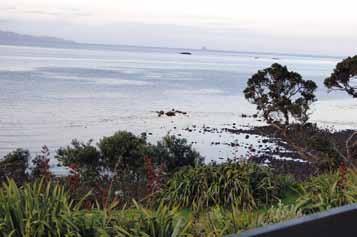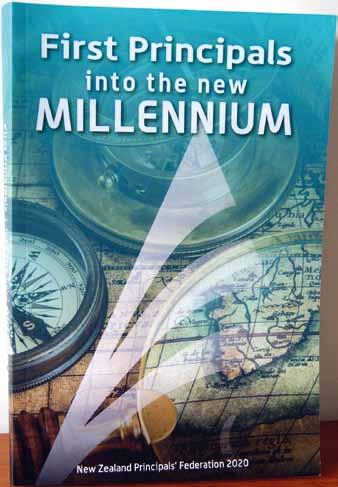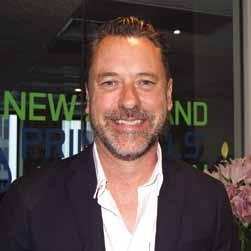Geoff Lovegrove, author of ‘First P the new Millennium’ talks with Liz H Liz Hawes
Editor
His colleagues often describe him as the wise one, the one who has years of experience and who uses knowledge critically. His mentoring skills are legendary, as are his communication and writing skills. Dozens of grateful principals still thank him for helping them to manage their way out of impossible crises. He is gentle, humble and humorous. He is retired school principal, Geoff Lovegrove. Highly respected for his professionalism, Geoff was repeatedly re-elected to the NZPF national executive from 1989 to 2010. He was president for two years, treasurer for five and editor of this magazine for nine years, signing off his last magazine in June 2010. It is rare to meet a former school principal who continues to be connected at so many levels of education in the way that Geoff is, nor one who carries as much knowledge and love of its history. Who better to write the sequel to Tom Brown’s ‘First Principals – A history of the New Zealand Principals’ Federation’? As we settle into a comfortable little café in Geoff ’s retirement town of Feilding, I ask him why recording NZPF’s history matters. ‘We do not often record events as they are happening, and then, as time passes, we wonder what happened, and what led to the outcomes that resulted. NZPF is still a relatively young organisation and it is great that our forebears thought to keep good records. Even better, we had people like Tom Brown to access the records, interview key people, and write First Principals, covering those critical early years. Why the word “Federation”? How did we get involved internationally? Those details are important, and we should be delighted that someone had the foresight to document this in formation.’ George Santayana, the renowned philosopher, once said that those who cannot remember the past are condemned to repeat it. It is a quote that has stuck with Geoff, who says, ‘before written word accounts, our forebears depended on oral accounts of history which were passed on through the generations resulting in widely varying versions and interpretations of the same event’. It is vital, he said, that good, accurate evidence is collected, factchecked, agreed and approved for safe keeping. In this way we can learn from the mistakes of the past. That said, we can’t resolve every issue immediately. The answer, Geoff says, is in persistence. He points to acclaimed educators such as Michael Fullan and Andy Hargreaves who have written extensively about ‘what’s worth fighting for?’ in respect of school leadership. ‘There will always be issues in education,’ he says, ‘and the role of NZPF is to hold fast to its agreed aims and ideals as it seeks to influence policy makers and educational powerbrokers.’ Those aims and ideals are to be the most respected and influential advocate for New Zealand’s school principals and to provide a voice and support for principals as they lead New 12
NZ Principal | November 2 0 2 0
Zealand schools. In terms of history, Geoff explains that in the decade before the Tomorrow’s Schools policy was implemented, principals had come to the realization that they needed better support and representation. They were aware that major changes were coming for the administration and governance of schools and wanted a structured professional organization through which principals would support and represent their peers. That was the impetus for establishing NZPF, which would complement the work of the unions. ‘This work will never be completed,’ says Geoff, ‘as the challenges of school leadership will become more complex, and the need for strong advocacy even more critical.’ Over the years NZPF has become stronger and more influential. Geoff lists the main strengths of NZPF as having a history of strong leadership, having highly skilled national executive members and national office staff, being respected by political leaders and their officials, having resilience (Governments come and go but principals endure!), having commitment to a just cause backed by proven educational theory, and having ready access to members. During his own time as president (1999 and 2000) there were three key issues to confront. These were appropriate PLD for principals, curriculum support and establishing a network of principal advisors. ‘It was inconceivable that school leaders were expected to undertake their complex duties with absolutely no PLD training or support from the Ministry,’ he said. ‘The battle to have this need recognised (and addressed) continued throughout my two years in the hot seat. It was not until a year after my presidency that some major PLD advances were achieved for principals.’ On the subject of curriculum support, Geoff reminisced fondly about the work of curriculum advisors who acted as mentors for principals and provided expert advice on all subjects including reading, mathematics, science, the arts, physical-education and social studies. ‘We looked to extend and improve these services, but instead they were pared back and eventually disappeared,’ he said sadly. ‘We also focused on establishing a network of principal advisors,’ he said. ‘We sought a system-wide allocation of experienced school leaders who could assist with hauora issues that were emerging.’ It would be a long wait for the Principal Leadership Advisory (PLA) to be set up, and not until 2015 was David Hain, the first advisor, appointed in Northland. Today there are 36 PLAs employed by Evaluation Associates across the country but NZPF believes that number should be doubled. Geoff agrees, there is much more work to do yet. One question Geoff would not be drawn on was whether the





